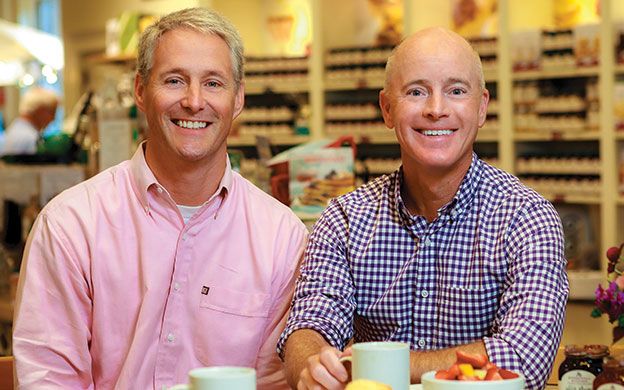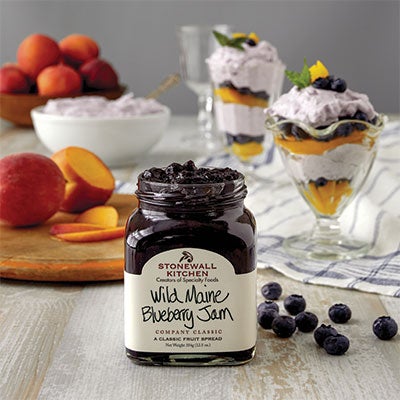Since Stonewall Kitchen was launched 24 years ago, it has grown into an iconic Maine brand, as ubiquitous as L.L.Bean or Tom’s of Maine.Now, the maker of specialty jams, dips, sauces, seasonings and other products is looking to spread the success it’s had in New England nationwide. Eight months after the founders announced plans to […]
Get Instant Access to This Article
Subscribe to Mainebiz and get immediate access to all of our subscriber-only content and much more.
- Critical Maine business news updated daily.
- Immediate access to all subscriber-only content on our website.
- Bi-weekly print or digital editions of our award-winning publication.
- Special bonus issues like the Mainebiz Book of Lists.
- Exclusive ticket prize draws for our in-person events.
[bypass-paywall-buynow-link link_text="Click here to purchase a paywall bypass link for this article"].
Since Stonewall Kitchen was launched 24 years ago, it has grown into an iconic Maine brand, as ubiquitous as L.L.Bean or Tom's of Maine.
Now, the maker of specialty jams, dips, sauces, seasonings and other products is looking to spread the success it's had in New England nationwide. Eight months after the founders announced plans to retire, with a new CEO and an infusion of cash from a New York-based private equity firm, the York-based company says it will focus on growing its wholesale business and sending signature products to more markets across the nation.
“We want to bring the New England experience to more people,” says CEO John Stiker, who took the helm in October. “That's really our mission.”
As one of York County's major employers the company's core operations will remain intact.
“I didn't come in with these plans to change direction,” says Stiker. “It's a fabulous company doing great things. We just want to make it more available to more people. You have a lot of awareness of the brand — it's simply tough to find.”
From a kitchen to corporate HQ
Stonewall Kitchen has the kind of origin story that many artisan food makers may dream about.
In 1991, founders Jonathan King and Jim Stott started selling jams at farmers markets and eventually expanded into vinegars, oils, pesto and baked goods. After attending New York's Fancy Food Show in 1995, and winning awards for Outstanding Product Line and Outstanding Preserve (for its Roasted Roasted Garlic Onion Jam), orders from major retailers started pouring in.
Their breakout product was Orange Cranberry Marmalade. In the rush to fill their first major wholesale order, which came from Crate and Barrel, King and Stott inadvertently misspelled the name on the labels. Crate and Barrel received boxes of jars labeled “mamalade.”
King, swooped in immediately to explain, in his unmistakeable New England accent, saying, “That's how we say it in Maine!”
The company now has 500 products and 10 retail stores in five states. Through wholesale customers, Stonewall Kitchen products are sold at approximately 6,000 stores. The company has 389 employees, including 289 in Maine, plus another 150 seasonal workers between September and December.
The company's 57,000-square-foot corporate headquarters — which includes its factory, test kitchen, retail store, cooking school and café and is just off of Exit 7 on I-95 — draws 500,000 visitors a year. It also provides a steady stream of off-season revenue for the county, long after the summer beach-bound tourists have flocked back home.
The company makes all of its “wet” products — including jams, pesto, dips, dressings and other jarred goods — in York. The cakes, cookie and mixes for other dry goods are made at other manufacturing facilities.
As Stonewall Kitchen has grown, it has inspired a generation of artisanal food makers burgeoning in Maine, says James C. McConnon, an extension business-and-economics specialist and professor of economics at the University of Maine.
The number of food and beverage companies in Maine grew 19% between 2010-13. The bulk of that growth has come from people who are starting just like Stonewall's founders, making products, selling at farmers markets and working to earn more wholesale customers, McConnon says.
Companies like Stonewall and Tom's of Maine — both of which grew from two-person operations to multinational brands — had a lot to do with influencing that, he adds.
“What Tom's of Maine did for the health care products industry, I think Stonewall has done for the gourmet specialty food industry here in Maine,” says McConnon.
By 2013, King and Stott realized that they had reached a turning point. The company was primed to grow. But after more than two decades, King and Stott were ready to step back. So they hired an investment banker to find a buyer, and inked a deal with Centre Partners, a private equity firm with offices in New York City and Los Angeles.
“We've worked so hard to create this brand,” says King, who plans to remain with the company for three years as chief creative officer. “The one thing we didn't want to do is stagnate. We didn't want to deprive the company of the opportunity to grow. But we knew we weren't the ones who wanted to do that alone.”
Growth in specialty foods
The change at Stonewall happens at a time when the market for the specialty foods the company makes is experiencing unprecedented growth.
Sales of specialty foods hit $109 billion in sales in 2014 according to the National Specialty Food Association, a New York-based trade group. The market grew 19% between 2012 and 2014, outpacing sales of general groceries, which grew by 2% during that time.
The growth is being driven largely by consumers in their 20s and 30s, says Ron Tanner, vice president of philanthropy, government and industry relations at the National Specialty Food Association.
“They aren't looking for prepared foods with additives. They're looking for foods that are more natural and pure,” he says. “They are really changing the way they're eating. They're focusing less on price and looking more for authenticity and taste.”
And it's an appetite that doesn't seem to be dampened by gyrations in the economy. During the last recession, sales of specialty foods slowed, but still grew 4% to 5% on an annual basis, says Tanner.
During the downturn, “people couldn't afford to go out and buy a new car,” he says. “But they certainly could buy a $4 jar of mustard. Food was one of the last affordable conveniences that people will cut back on.”
Even as the market for specialty foods has become increasingly crowded in recent years, Stonewall has maintained its appeal by introducing a steady stream of new products and showing customers how to use them, Tanner says. The company has 800 recipes on its website, provides recipe cards and cooking demonstrations in retail shops. Recipes, in fact, are the top item searched on its site. The Stonewall Kitchen cooking school, which opened in 2008, had more than 10,000 students last year.
“People need to know how to use your products,” Tanner says. “Stonewall has really done a marvelous job with educating people about that, particularly in their stores.”
That's particularly important when you're constantly introducing new products. Stonewall Kitchen introduces about 40 new recipes each year.
On the road ahead, Stonewall's new product lineup may include frozen foods. Seeing the success of brands like Petaluma, Calif.-based Amy's Kitchen, King and Stiker say they see room in the market for the classic, comfort foods with clean ingredient lists that are ready to heat and serve.
“We just want to take how Stonewall does jams and grilling sauces, and take it to the frozen element,” says King.
Expansion plans
The future for Stonewall includes expansion in the wholesale business, which accounts for about 60% of total sales. The company hopes to get more of its products into retailers like grocers where they haven't been before.
“Wholesale was really the driving force of our business,” says King. “As we began to expand, we realized that our distribution was just not up there. Even though it feels like we're everywhere in New England, try finding us in Georgia or Louisiana.”
Supermarkets are devoting increasingly more shelf space to specialty foods to satisfy shifting consumer appetites. Indeed, 82% of sales of specialty foods are made at mass retailers like supermarkets, club stores and drugstores, according to the National Specialty Food Association. That has grown by 18.6% since 2012.
“There are more stores today that are a fit for our product than there have been in the past,” says Stiker. “So we're in kind of a nice spot to take advantage of that.”
The company leaders plan to be highly selective about the supermarket chains and specific store locations where they put their products.
“Our products are not going to be right for every store,” says King. “If it's a grocery chain it might be right for 10 of their 100 stores.”
As the company broadens its reach, it will continue to develop specialty products exclusively for their retail and online channels. In the fall, the company plans to roll out a new website, and reach more of Stonewall customers who are die-hard Amazon shoppers.
While some Stonewall Kitchen products have long been sold on Amazon through resellers, sometimes those products would be featured in older packaging or with inconsistent pricing. “That's not the customer experience we want them to have,” says Stiker. While Stonewall won't ever have its full lineup on Amazon, the company will start beefing up its product line there. “It [Amazon] has become one of the world's largest marketplaces.”
To accommodate the growth on the road ahead, Stonewall is also expanding its distribution capacity. Next April, the company plans to open a new 74,000-square-foot distribution center in Dover, N.H.
King says he is not worried that broader distribution will dilute the brand's cache.
“I don't think growing the brand is a formula for destroying the brand,” says King. He points to other home-grown brands like Burt's Bees and Tom's of Maine, which began in Maine but grew their reach to become more widely available throughout upscale groceries throughout the nation.
“I think people love those brands as much today as they did 20 years ago.”


